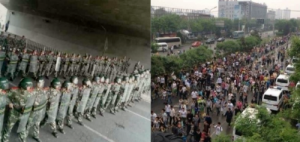May 22, 2013
The paradox of fear and stability in today’s China.
May 8 at the Jingwen Wholesale business center. Hundreds protest police action after the death of a 22-year-old girl; police line up on a side street in riot gear. Photos: Weibo via Beijing Cream.
How can it be that a book on the French Revolution, written by an aristocratic French historian and political thinker from the 19th century, has inspired a modern Chinese bureaucrat to the extent that he has strongly recommended it to his Politburo colleagues? Not only that but Alexis de Tocqueville‘s bourgeoisie book The Old Regime and the Revolution (1856) has now been reprinted and is very popular among China’s high cadres. The man who introduced this book to China’s elite was Wang Qishan, one of the seven members of the Standing Committee of the Politburo, and the current head of the Central Committee for Discipline Inspection. He has been at the core of the think-tank in Beijing since the CCP’s 18th Party Congress and his declared ambition is to fight against corruption. While the so-called “kill the tiger, but also the flies” tactic of Xi Jinping’s administration is controversial and unconvincing in eyes of observers and the common people, Wang is known for his low-profile working style. As chief of the Disciplinary Committee, he now stands at the forefront of dealing with the metastasis of corruption and confronts the most complex issues and crises on a daily basis.
In his book, Tocqueville analyzes the social conditions, causes, and forces that triggered the French Revolution. He points out that the revolution happened not while society was in a state of stagnation, but while reform had already started; it was important “to continue the process of modernizing and centralizing the French state which had begun under King Louis XIV.”
For Wang Qishan, the thunderbolt in Tocqueville is his profound analysis of an inevitable and imminent revolution. The present situation in China has many similarities to the precondition of the French Revolution—even though 224 years lie between them. For his part, Wang wants to impart a sense of crisis among China’s leading politicians and put it on the agenda, to redistribute the unbearable heaviness of responsibility among different pillars of power. Besides, the aftermath of revolution is totally vague. What kind of new social and political order will be built up to replace the existing mutated crossbreed of communism and capitalism? The Singapore-model has been much discussed behind closed doors, as always, and neither the elite nor the public are involved in the discussion.
It’s a contradictory situation in China. When you walk through the city streets and see all the well-dressed people in the colorful, glinting shops, the vigorous supply and demand of the market, the magnificent buildings, the high-speed railways, the gigantic modern bridges strung across rivers, you think that this is a rich and modern country. On the other hand, if you go online and read all the news about uprising, protest, suppression, and injustice, a shiver of despair will take hold of you. Many people believe that minor and uncontrolled incidents can trigger a catastrophe that could ruin stability in an instant.
The recent death of a 22 year-old Anhui migrant girl, who fell from the fourth floor of the Jingwen Wholesale house in Beijing where she worked, is a typical case of simplicity that nevertheless seethes with danger. The incident happened at 4:00 a.m. on May 3. According to the police, the girl in question committed suicide; her family didn’t believe the explanation and asked to see the footage from the warehouse’s closed-circuit cameras. The police refused to show the video of the incident. Rumor spread that the girl was first raped by several guards, then murdered. The police closed the case quickly and the media was not allowed to report on it. Online information was blocked and all the related names and keywords were filtered. Then an astonishing thing happened. On May 8th, thousands of migrant workers from Anhui gathered in front of the Jingwen Wholesale business center in protest. They asked the police to release evidence of the death. It was one of the largest protest actions in years. Armed police were mobilized and helicopters circled in the sky.

